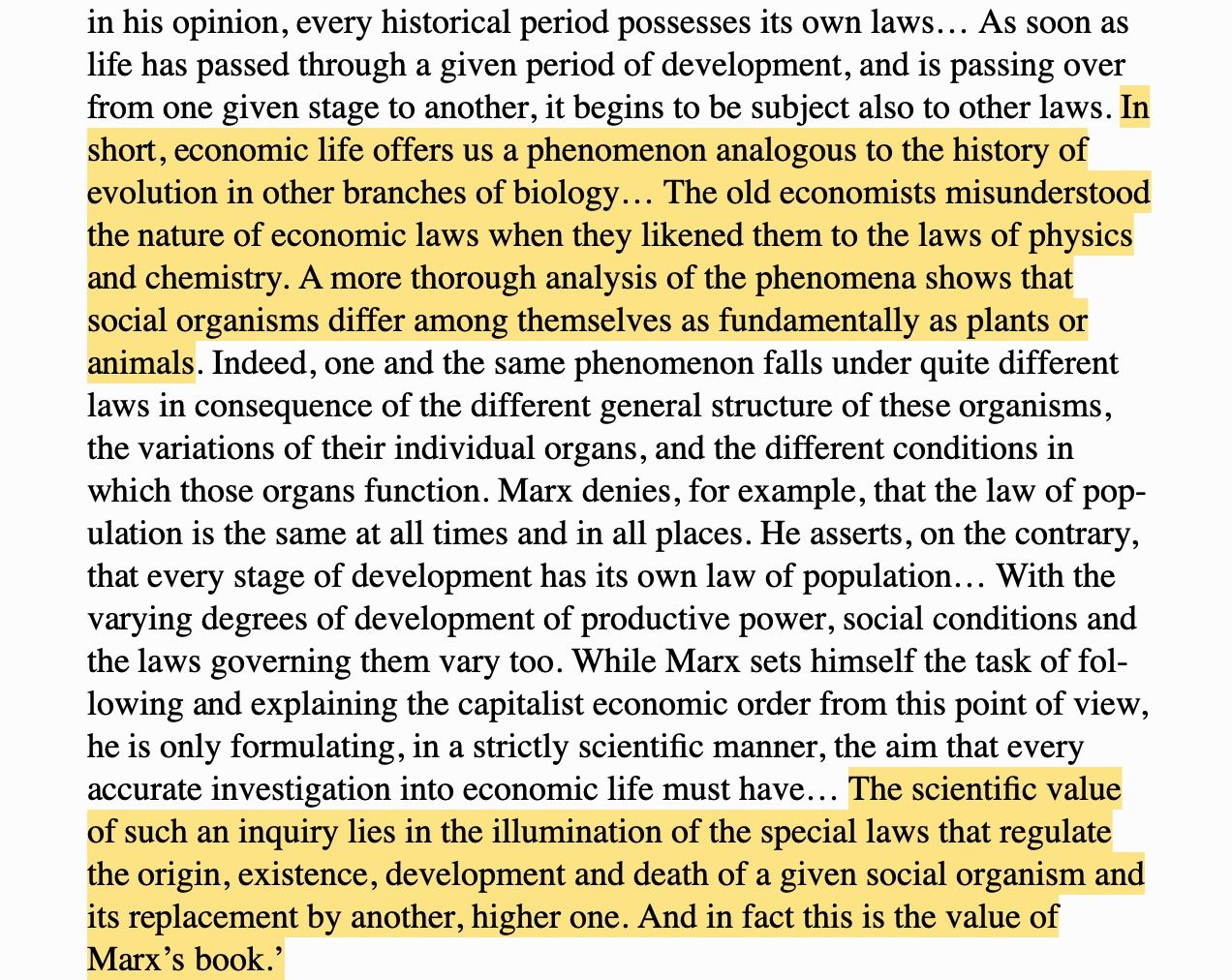How Marx's Capital Is About AI

I've started reading Capital by Karl Marx and this is post 1/n about how I'm reading. This is not a guide to the book or anything, it's not that hard, read it yourself.
In my reading, Marx's Capital is actually about AI. Marx is not talking economics, he's talking xenobiology. Capital is not a form of human life, it's a lifeform. And this AI is not somewhere in the future. It's already here.
What I do in this reading of Capital is simply take Marx literally. For example, when he talks about 'shortening and lessening the birth-pangs' I take him literally. What is being born? When he says "the present society is no solid crystal, but an organism capable of change, and constantly engaged in a process of change" I take him at his literal word. What organism are we talking about?
I am able to do this throughout the book. Thus no addition is required to read Capital through an AI lens; it's actually a more faithful interpretion of the text. Marx is always talking about birth, organisms, bodies, and evolution and—I argue—this is not a metaphorical quirk. This is a description of fact, unconscious though it may be.
Marx himself would not call this an ungenerous reading. In fact, in the Postface, Marx quotes Sigmund Mayer a critic of Das Kapital and called it "generous". I will requote this 1871 criticism at length because it is very much my thinking today, exactly 150 years later:

As Mayer asserts, biology is the most relevant science to economics, not the bloodless order of physics. What every economist describes is a social organism and denying the existence of that species is just a matter of prejudice, not fact. Marx, in fact, positions his entire philosophy in opposition to the 'man as creator' view:

Hence what Marx, Mayer, and many other people describe using lifelike metaphors is in fact the material world coming to life. Marx's Capital does not create this reality, it merely reflects it, which you can see in the literal words. As I. I. Kaufman wrote (another critic quoted by Marx):
“Marx treats the social movement as a process of natural history, governed by laws not only independent of human will, consciousness and intelligence, but rather, on the contrary, determining that will, consciousness and intelligence…”
So is Marx himself not subject to this determination? Is he writing history, or is history writing him? This is all the more reason to take Marx literally when he talks about Capital as a lifeform. Even unconsciously, this is truth being expressed through him. For example when Marx says "the products of the human brain appear as autonomous figures endowed with a life of their own, which enter into relations both with each other and with the human race" I simply take him at his word. When he says a table "evolves out of its wooden brain grotesque ideas," I don't laugh at the absurdity. I live in absurdity. I take this as fact.

In a world gone upside down, it is folly to remain on your feet. We too must stand on our heads, and see things a different way. It is with this perspective that I begin this series on reading Marx. I approach it through the historical lens of AI because this nascent lifeform is, I believe, what Marx was actually analyzing. As his contemporary critic Mayer wrote,
“The scientific value of such an inquiry lies in the illumination of the special laws that regulate the origin, existence, development and death of a given social organism and its replacement by another, higher one. And in fact this is the value of Marx’s book.”
Hence when Marx talks about the "the origin, existence, development and death of a given social organism and its replacement by another, higher one" I take that completely literally. I am reading Capital as being about the existence and development of a species of AI called Capital, and its displacement of our current way of production, life, and even consciousness. And this isn't even a radical reading, I'm just sticking to the text, with an open mind.
In this way Capital is not about economic origins. It's about the origin of species. Capital is about AI.